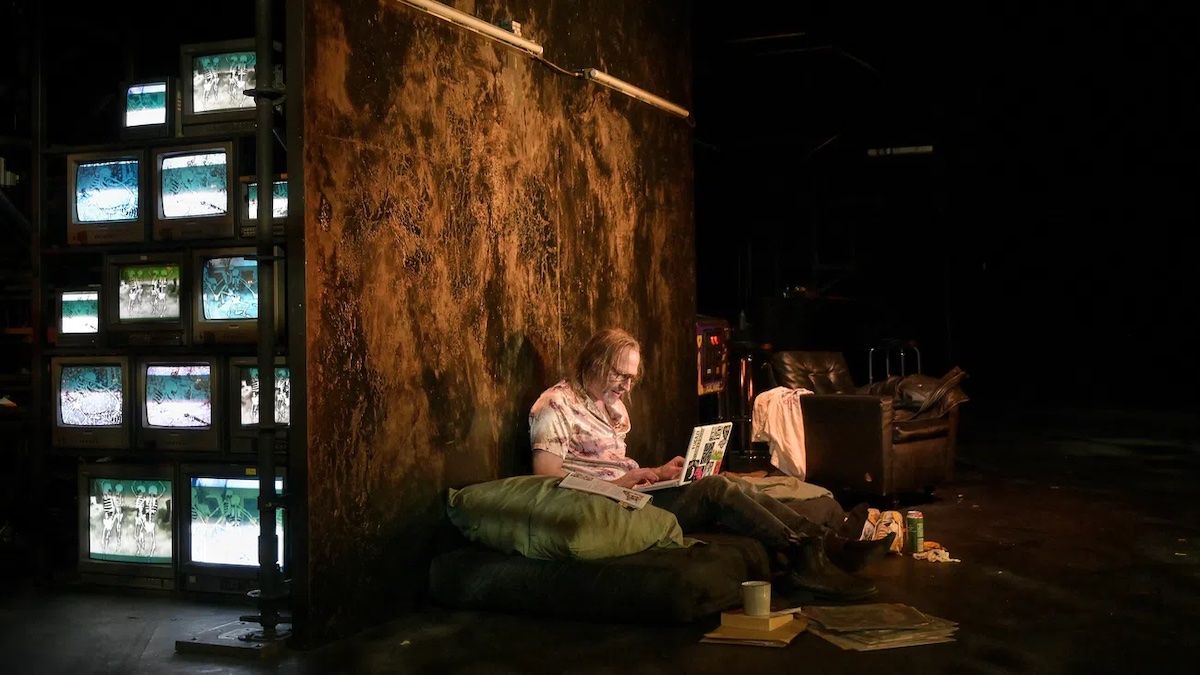
Over the years I have seen numerous successful stage adaptations of novels. Even so I remain a bit skeptical of putting novels on stage. It often comes down to reducing the novel to the dialogues and monologues. There is a reason that in classical times the literary domain was divided into three major genres: lyric, epic and drama (*). The theatre doesn't tell anything. It shows. In principle a novel can do without people, although in practice very few novels do. The theatre can’t. A novel can describe a landscape, a scene or a room, the theatre can only show it.
The opening scene of Das Leben des Vernon Subutex 1, an adaptation by Thomas Ostermeier of the award-winning novel of the same title by Virginie Despentes, confirmed my doubts. A narrator who stood slightly apart from the main scene introduced the main character of the novel, Vernon Subutex, and how he ended up in the situation he finds himself in. This to me seems a bit of a stopgap.
I was quickly won over though, mostly by the inventive set design and by Joachim Meyerhoff, who is phenomenal in his role as Vernon Subutex. I wish I recalled all his deadpan remarks to casually throw into a conversation.
I should add that the novel lends itself to a stage adaptation. Each chapter consists of a monologue, or perhaps rather a rant, by a different character.
I had recently read the novel, which was a lot better than I expected. Virginie Despentes really manages to get inside the mind of her characters. She's also unafraid to portray some uncongenial characters. The novel tells the story of Vernon Subutex, a former record store owner, who is kicked out of his flat and of the people he stays with for a few nights, before ending up on the street. There's also a subplot, because Vernon Subutex owns the recording of a self-interview by a recently deceased rock star, which a lot of people are interested in. Because of its rich cast of characters the novel gives a vivid portrayal of contemporary France.
The stage resembles a turn table, which turns around at every scene change. One side shows alternately a living room or a bar, while the other side is occupied by a band, which plays covers of 70s and 80s punk songs at concert volume. The set thus also serves as a metaphor for Vernon Subutex’s former record store, Revolver. It also creates a bit of a party atmosphere. Indeed, one scene portrays a party at which Vernon Subutex serves as a dj.
At more than five hours the performance is quite long, but it doesn’t feel like it, largely because of the musical intermezzos and because there is always something happening on stage.
It was a joy to be back in a theatre again and to see a live performance. Leave it to the Germans to ensure that the whole machinery of checking everyone’s proof of vaccination or negative Covid test and entering and exiting the theatre runs smoothly.
(*) I am familiar with so-called postdramatic theatre in which the text is no longer the central element and empathy or Einfühlung is no longer the driving emotion. However, I often wonder what is postdramatic about postdramatic theatre. But this may be because most theatre productions that I have seen are labelled as postdramatic (Robert Wilson, Forced Entertainment, Romeo Castellucci and the Societas Raffaello Sanzio, Frank Castorf, René Pollesch, Jan Fabre, Nicolas Stemann, Heinner Goebbels, Falk Richter, Christoph Schlingensief and so on).